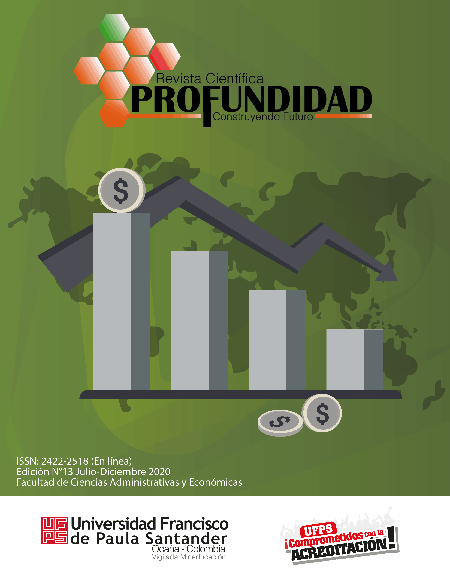Financial development in times of economic crisis- case study Latin America: Argentina, Chile and Colombia
El desarrollo financiero en épocas de crisis económica- caso de estudio América Latina: Argentina, Chile y Colombia
Main Article Content
The regions that are part of a geographical sector must postulate scenarios of autochthonous protagonism among their leaders and change managers, not only from the local but also from the financial point of view, in order to consolidate long-term financial developments. Colombia, Chile and Argentina are emerging as examples of crises over several decades and their economies and financial developments have been conditioned to these historical moments. The objective of this article was to address the main measures and indicators that the governments of Colombia, Argentina and Chile have postulated regarding the management of finances. The methodological process was documentary, taking reports from ECLAC, the World Bank, OECD and also internal levels to each commented region. The economy reports, growth studies will be the primary source of review. Among the results obtained is the presentation of sectoral analyzes and ideas rescued from said cooperation organizations between Colombia, Argentina and Chile as pillars of the local and regional economy. It seeks to serve as a base for future accounting professionals in the historical environment so that globalized scenarios of the Latin American region are fully understood.
Downloads
Publication Facts
Reviewer profiles N/A
Author statements
- Academic society
- Universidad Francisco de Paula Santander
- Publisher
- Universidad Francisco de Paula Santander
Article Details
Banco Mundial. (20 de Abril de 2018). La inclusión financiera es un factor clave para reducir la pobreza e impulsar la prosperidad. Obtenido de https://www.bancomundial.org/es/topic/financialinclusion/overview
Banco Mundial. (2019). Colombia en cifras. Obtenido de https://datos.bancomundial.org/pais/colombia
Banco Mundial (2020). The economy in the time of covid-19. Semiannual report of the latin america and caribbean region, Abril de 2020.
CEPAL. (1974). Teoría del desarrollo regional: un intento de síntesis. Obtenido de https://repositorio.cepal.org/bitstream/handle/11362/33638/S7400534_es.pdf?sequence=1
Naciones Unidas. (21 de enero de 2019). Situación y perspectivas de la economía mundial en 2019: Resumen ejecutivo. Obtenido de https://www.un.org/development/desa/dpad/publication/situacion-y-perspectivas-de-la-economia-mundial-en-2019-resumen-ejecutivo/
OCDE. (Enero de 2015). Colombia políticas prioritarias para un desarrollo inclusivo. Obtenido de https://www.oecd.org/about/publishing/colombia-politicas-prioritarias-para-un-desarrollo-inclusivo.pdf
OCDE. (6 de Diciembre de 2017). Estudio Económico del OCDE de Chile 2018. Obtenido de https://www.oecd.org/economy/surveys/Chile-2018-OECD-economic-sruvey-Spanish.pdf
OCDE. (27 de Marzo de 2019). La OCDE afirma que Argentina necesita más reformas para conseguir una economía más fuerte e inclusiva. Obtenido de http://www.oecd.org/newsroom/la-ocde-afirma-que-argentina-necesita-mas-reformas-para-conseguir-una-economía-mas-fuerte-e-inclusiva.htm
OCDE. (24 de Octubre de 2019). Presentación del Estudio Económico de la OCDE sobre Colombia 2019. Obtenido de https://www.oecd.org/about/secretary-general/economic-survey-of-colombia-october-2019-sp.htm
OCDE. (9 de Abril de 2020). La pandemia mundial del COVID-19. Obtenido de http://www.oecd.org/dac/development-assistance-committee/Declaracion-CAD-La-Pandemia-mundial-del-COVID-19.pdf
ONU. (11 de Noviembre de 2019). La economía de América Latina continúa estancada y las perspectivas apuntan a un bajo crecimiento. Noticias ONU, pág. 2.











